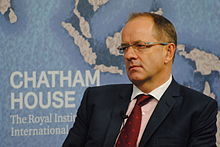Andrew Witty
| Sir Andrew Witty | |
|---|---|

Andrew Witty on 22 October 2015 at Chatham House
|
|
| Born |
Andrew Philip Witty 22 August 1964 |
| Occupation |
CEO, GlaxoSmithKline |
| Salary | GB£6,700,000 (2015, total compensation) |
| Predecessor | Jean-Pierre Garnier |
| Successor | Emma Walmsley |
| Spouse(s) | Caroline M. Witty (née Hall) |
| Children | 2 |
CEO, GlaxoSmithKline
Sir Andrew Philip Witty (born 22 August 1964) has been the chief executive officer (CEO) of GlaxoSmithKline since 2008, and is Chancellor of the University of Nottingham. On 17 March 2016 it was announced that Witty will retire from GlaxoSmithKline in March 2017, and will be succeeded by Emma Walmsley.
Witty attended Malbank School (originally the "Nantwich and Acton Grammar School") in Nantwich, and then gained a bachelor's degree in Economics from the University of Nottingham.
Witty joined Glaxo UK in 1985 as a management trainee. He held various positions in the UK, including Director of Pharmacy & Distribution in Glaxo Pharmaceuticals UK, Director of Business Development of Biocompatibles Limited and International Product Manager of Glaxo Holdings PLC. He served as Managing Director of Glaxo South Africa and Area Director of South and East Africa.
He served as a vice president and general manager of marketing of Glaxo Wellcome Inc., a subsidiary of GlaxoSmithKline with responsibility for strategy development, marketing execution and new product positioning. He served as an economic adviser to the Governor of Guangzhou, China from 2000-02.
He was appointed president, Pharmaceuticals Europe of GlaxoSmithKline plc in January 2003 and succeeded Jean-Pierre Garnier as CEO following his retirement in May 2008. He is paid an annual salary of GB£948,000 and receives bonuses and other compensation amounting to GB£2,180,000 for this role.
In February 2009 he pledged to make a major change in the way GSK pharmaceuticals are priced, in an attempt to make vital drugs more affordable in countries with the lowest incomes. At the same time he announced that GSK would place certain patents in a pool so that they were freely available for others in the search for new drugs.
On 2 July 2012, GSK pleaded guilty to criminal charges and agreed to a $3 billion settlement of the largest health-care fraud case in the U.S. and the largest payment by a drug company. The settlement is related to the company's illegal promotion of prescription drugs, its failure to report safety data, bribing doctors, and promoting medicines for uses for which they were not licensed. The drugs involved were Paxil, Wellbutrin, Advair, Lamictal, and Zofran for off-label, non-covered uses. Those and the drugs Imitrex, Lotronex, Flovent, and Valtrex were involved in the kickback scheme.
...
Wikipedia
